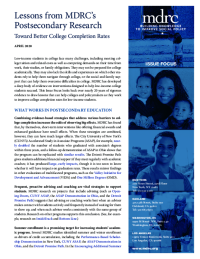Lessons from MDRC’s Postsecondary Research
Toward Better College Completion Rates

Low-income students in college face many challenges, including meeting college tuition and related costs as well as competing demands on their time from work, their studies, or family obligations. They may not be prepared for college academically. They may also lack the skills and experiences on which other students rely to help them navigate through college, or the social and family support that can help them overcome difficulties in college. MDRC has developed a deep body of evidence on interventions designed to help low-income college students succeed. This Issue Focus looks back over nearly 20 years of rigorous evidence to draw lessons that can help colleges and policymakers as they work to improve college completion rates for low-income students.
What Works in Postsecondary Education
Combining evidence-based strategies that address various barriers to college completion increases the odds of observing big effects. MDRC has found that, by themselves, short-term interventions like offering financial awards and enhanced guidance have small effects. When these strategies are combined, however, they can have much larger effects. The City University of New York’s (CUNY’s) Accelerated Study in Associate Programs (ASAP), for example, nearly doubled the number of students who graduated with associate’s degrees within three years, and a follow-up demonstration of ASAP in Ohio shows that the program can be replicated with similar results. The Detroit Promise Path gives students additional financial support if they meet regularly with academic coaches; it has produced large, early impacts, though it is too soon to know whether it will have impacts on graduation rates. These results mirror findings in other evaluations of multifaceted programs, such as the Valley Initiative for Development and Advancement (VIDA) and One Million Degrees (OMD).
Frequent, proactive advising and coaching are vital strategies to support students. MDRC research on projects that include advising (such as Opening Doors, CUNY ASAP, the ASAP Demonstration in Ohio, and the Detroit Promise Path) suggests that advising or coaching works best when an adviser makes contact with students actively and frequently instead of waiting for them to show up, and when each adviser works consistently with the same group of students. Research on other programs supports this conclusion. (See, for example, research on InsideTrack and Bottom Line.)
Summer enrollment is a promising target for increasing students’ academic progress. Several MDRC studies identified summer and winter enrollment as drivers of credit accumulation, including the Performance-Based Scholarship Demonstration in New York, CUNY ASAP, the ASAP Demonstration in Ohio, and the Detroit Promise Path. In the Encouraging Additional Summer Enrollment (EASE) project, MDRC found that students earn more credits if they are encouraged to enroll in summer sessions and are given financial support to do so. Research by others suggests, similarly, that summer courses can help students stay in school and increase their odds of completion.
Approaches inspired by behavioral science can increase participation in activities that promote student success. Insights from behavioral science can help colleges see the unnecessary hindrances or hassles they may be putting in students’ paths. Simple adjustments such as sending reminders or presenting information more clearly can boost the numbers of students who go to advising sessions, submit their financial aid applications, or enroll in summer courses. MDRC is increasingly applying these insights to its work in postsecondary education using tools like the SIMPLER framework, which summarizes several key behavioral concepts that program staff can implement easily.
Insights from regular analyses of data can be used to help students make greater use of available services and to ensure that programs are producing the desired effects. Several MDRC projects use management information systems that allow college staff members to monitor student activity, respond quickly when students veer off track, contact students when it appears they might be having trouble, and reinforce positive behavior with incentives or messages when appropriate. Such strategies are used in the ASAP Demonstration in Ohio, the Detroit Promise Path, and Scaling Up Community College Efforts for Student Success (SUCCESS).
Reforms to developmental education are changing the course landscape for students. Colleges across the country are undertaking all sorts of reforms aimed at improving developmental (remedial) courses. MDRC is evaluating several types of strategies that, instead of relying solely on test scores to place students into courses, are using data beyond one measure to determine course placement. Called “multiple measures assessment,” these projects are beginning to show early findings on completion of college gateway courses, which are credit-bearing. Institutions have successfully changed teaching practices in both the Dana Center’s Mathematics Pathways (DCMP) and CUNY Start projects. DCMP is increasing students’ likelihood of taking and passing gateway courses in math, and early CUNY Start findings show that the program is improving completion of developmental courses. Still, little rigorous evidence about instructional practices is available, and the field needs guidance about how to improve teaching.
Interventions are not enough. More fundamental change at the institutional level may be required to achieve meaningful increases in course completion. Finding highly effective strategies will not, by itself, improve outcomes on a large scale, especially when those strategies require a major reallocation or commitment of resources. MDRC has also studied institutional-level initiatives such as Achieving the Dream and Completion by Design, and has observed how difficult it is for colleges to change practices systemwide and substantially alter the college experience for large numbers of students. More research is needed to discover how the current movements to redesign community colleges are having an impact on students’ outcomes.
If you’re interested in learning more about MDRC’s postsecondary education work, contact Alexander Mayer at Alexander.Mayer@mdrc.org.






